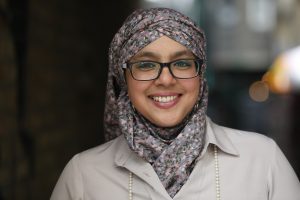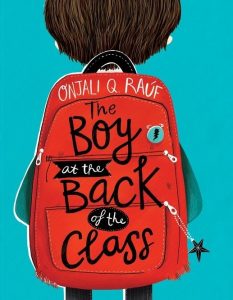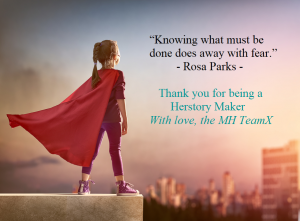Tell me what inspired you to write the Boy at the Back of the Class?
I’ve been so fortunate as to be travelling out in my spare time to the refugee camps of Calais and Dunkirk in France since 2015, to aid the phenomenal long-term volunteers working to help refugees stuck there. But there was no plan to write a book about anything to do with that arm of my works until 2017, when I was hospitalised and then housebound for over three months. It was during that time that the stories, faces and images of many a refugee I had had the honour of meeting came back to me in full force, and in particular the faces of baby Raehan and his mother Zainab. I had met Zainab when she was over eight months pregnant with Raehan and urgently searching for foods and clothes. The next time I went out with my team (specifically to help her prepare for the birth), she had already had Raehan. He was such a calm, gorgeous little two-week old, and it broke all of us to know he had had to begin life in the muddy swampy pits of Calais. After our return to London, the French government demolished the camps, and I lost touch with the family. I think of them every day with hopes they’re all safe and happy. But during my illness, I couldn’t get him out of my mind. And after my agent contacted me asking me if perhaps I wanted to write a story about refugees, the title ‘The Boy at the Class’ popped into my head, right there in hospital. And after I was well enough to start working again, the story just came out. A photo of baby Raehan is on my desk, so he was definitely the main inspiration behind it’s coming to be.
How hard was it to get your first book published?
Funnily enough, The Boy at the Back of the Class was not the book that I approached agents with. I spent years writing another book (a trilogy about an adventure centring on chocolate) which after about six years of sending it out to agents, led to me finally securing one. I never, in my wildest dreams, imagined there was even another story in my head, let alone a completely different book that would be written and published beforehand. It’s been a hard, slightly funny old road to this point. But I wouldn’t change it for anything.
How long did it take to write?
The first draft took less than three months. With about 25% of that time being spent on coming up with some blindingly bad illustrations! But it was the first time in my life that I couldn’t go to work and was housebound, so I think writing it saved my sanity in lots of ways. It gave me something to focus on that wasn’t to do with my physical incapacities.
How many publishers turned you down?
I know how many agents and publishers turned me down for my initial book. But miraculously, within weeks of the full manuscript for The Boy at the Back of the Class being submitted to my agent, she came back to me and said there was a publisher already willing to buy it. Hachettes were I believe, the first one to bite the bullet and take it, so it really was magic. I trusted my agent implicitly when she relayed their enthusiasm for it so there was nothing to question or wait for. And it’s all been a bit of a whirlwind since then!
What kind of reactions have you had to this book?
I’ve been amazed at the warm and wonderful responses received by bloggers, teachers, reviewers and children and parents alike. I was worried that people would roll their eyes and think me juvenile for even attempting to write a story for children about such a grave and painful issue. But it really has been beautiful. The most touching responses I’ve had are from families – grandparents and parents who have been inspired to read the book thanks to the fantastic little readers in their world, and coming back to me to say how the book has inspired discussions over the dinner table about refugees. A standout moment involved a Jewish grandfather saying his grandchildren had never asked him what it meant to be a refugee in the UK for him until they had read the book; another being a teacher in West Sussex, saying she was so inspired by the book that she was making plans to head out to Calais to help refugees. Such reactions were undreamt of and still have me in awe.
What can you tell us about your next book?
It’s at the very early stages of being written and edited, but three things for sure! 😊
- It’s called ‘The Star Outside My Window.’
- It features the National Observatory in Greenwich.
- And the Disney film The Lion King is important in it!
Did you celebrate being short listed for the blue peter award?
Yes! Firstly by screaming and making my mum deaf! Then by being taken out for a very posh cup of tea by my lovely editor and publishing leads.
Do you try and read the online reviews you get on say waterstones website?
I definitely read the reviews – whether they’re good or bad, just to get a pulse on people’s thoughts. Those reviews are so crucial to authors – especially brand new authors who literally have nothing else to go on and who aren’t being reviewed by the big papers, in getting a feel for what’s gone right as well as what’s gone wrong. I myself never write a review unless I’m either feeling super-enthused or super-angry, so I know it takes a lot for someone to feel the urge to take to their computers or phones and post something up. That’s why I’m hugely appreciative of every single person who takes the time to write them. I only wish I had the time and energy to write back to each one and say thank you!
Would you ever consider writing for teens or adults?
My very, very first manuscript was an awful, awful book called ‘Oh Pur-leeeeease!’, aimed at college-aged teens. I wrote it when I was seventeen over the course of a year, and it was basically a huge moan-fest about the ridiculous matter that is having to grow up and do A’levels! I told my university English Lit Professor about it in my first year, and she was so amused she very kindly sent it onto her own publishers in Wales – who came back to me very quickly with a ‘Sorry! No!’ I’m not sure if I would try teen or adult fiction, as children’s is infinitely more fun to write I think. But unless an idea that just had to be realised for either of those audiences suddenly appeared, I don’t think I would.
What did you do before becoming a writer? Or indeed still do?
I had lots of jobs working mainly for human rights and grassroots organisations. I still work full-time at Making Herstory – a not-for-profit I established in 2012 to help survivors of abuse, violence and human trafficking as well as the frontline services working so hard to keep women and children alive. I don’t think I’ll ever stop working in this field of human rights. Not unless I absolutely could no longer do so.
Which author inspires you?
There are so many authors who have inspired me, there’s no way I could narrow it to one (can anyone ever?). My earliest memories of reading and re-reading were shaped by Frances Hodgson Burnett; Anna Sewell; L.M. Montgomery; Roald Dahl; Enid Blyton; the authors of the Nancy Drew series; Agatha Christie; and so many more. The Tintin books by Herge were hugely important to me too, simply because I rarely saw characters who looked remotely like me (i.e. non-white) in the majority of my reading books. As I got older, those memories were added to by Alexandre Dumas; Jane Austen; Anthony Trollope, JK Rowling; Maya Angelou; Angela Carter; Margaret Atwood; Mary Shelley; Harper Lee; Mary Wollstonecraft; Leo Tolstory; Virginia Woolf; Arthur Conan Doyle; Chimamande Ngozi Adichie; Andrea Levy; R C Sheriff – to name a few. If a book can make me question the world I live in, punch the air, make my heart pound in some way, or leave me in tears, they make the cut!
Which genres do you read yourself?
I’ll literally pick up anything and read it – providing the story has me hooked before I turn the first page. Whether that be fiction or non-fiction. There’s an exception for overly gory / graphic / violent books, or anything bordering on horror. My imagination runs wild and I become immobile so those I won’t touch with a bargepole.
What is your biggest motivator?
The people I’m writing for. Sometimes that’s the reader. Sometimes it’s the people whose voices I’m trying to get through. Most times its both.
What will always distract you?
Another story. I’m a classic ‘starter’. I get super-excited when I have a new idea or a new story. But then I get bored about five minutes in because by then, another idea / story has popped up that I’m just as excited about. Finishing is definitely harder than starting in my world!
How much say do you have in your book covers?
My editor / publishers and my awesome illustrator, Pippa Curnick, come up with the ideas and present me with what they think will fit well. We’ve lucked out so far because I’ve loved pretty much the first drafts of what they’ve come up with. It’s a very open process, and with the second book, other than one minor detail regarding a constellation, there was nothing that I didn’t love about it. I’m sure if I didn’t like things there’d be a lot more to-ing and fro-ing!
As a child were you a great reader?
I don’t know about a great reader but I was definitely a dedicated one. I actually made myself go blind ahead of time because of books. As a kid, my mum used to turn out the lights at exactly 7.30pm – no matter how much we wanted to read on. So as soon as she would do that, I would go up to my window and read on using the awful yellow lamp outside. I ended up being the first in my class to be so blind as a bat, that I needed glasses. I still blame mum for my having to wear glasses!
Which book shop is your favourite?
It’s cheating – but can’t I just say all of them? Because I do. Every single one of them.
What can you not resist buying?
Books, stationary, and anything that I don’t really need more of in my life.
Do you have any rituals on your writing days?
I wish I had writing days! I have writing ‘hours’ and then ‘panic writing days’. Both of which involve drinking tea, chomping on chocolate, and not being able to escape my pyjamas.
How many books in your own to be read pile?
I have two piles – one huge one by my bed, and another smaller one downstairs in my living room. At a guess, combined, I would say at least forty.
What is your current read?
I usually have 4-5 books on the go. My current breakfast/morning read is A Fortnight in September by R. C. Sheriff; my commuting read is Born A Crime by Trevor Noah; my break-from-it-all book is Andy Shepherd’s The Boy Who Grew Dragons; and my last-thing-at night read is either a book of Tennyson’s poetry or Neal Gabler’s biography on Walt Disney – depending on how I’m feeling come the end of the day! 😊



